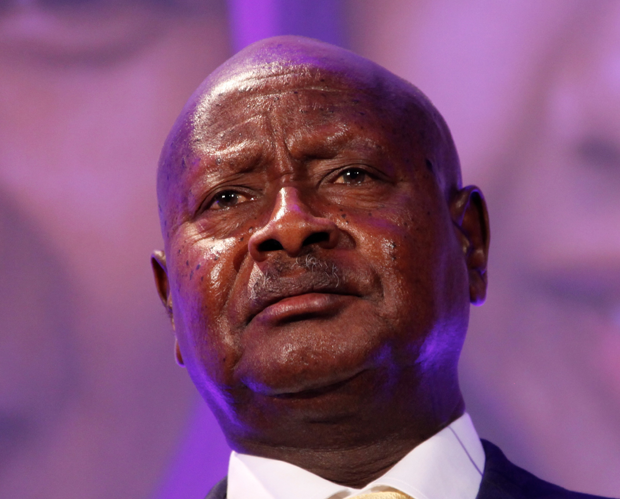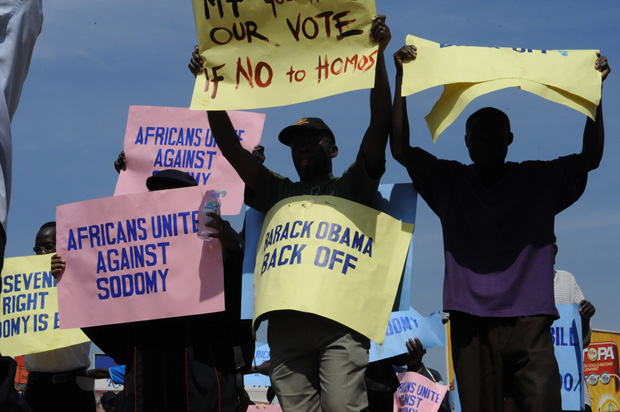Index relies entirely on the support of donors and readers to do its work.
Help us keep amplifying censored voices today.

Ugandan president Yoweri Museveni (Photo: Wikipedia)
President Yoweri Museveni signed Uganda’s Anti-Homosexuality bill into law on 24 February, and the fallout has already started. The World Bank has cancelled a $90 million loan to the country, European Union countries are threatening to withdraw aid, and the United States is reviewing its cooperation with Uganda. President Museveni has hit back, saying Uganda would raise its own money to fund its development projects. The US, which was the first voice its discontent, was told off: “Our relationship with the US was not based on homosexuality.” David Bahati, the MP who introduced the bill, said in an interview that the west is imposing social imperialism on Uganda, a thing they are not ready to accept.
“I will work with the Russians,” Museveni said.
So the president feels that even without the west, Uganda has development partners that it can still rely on. Considering he was not supportive of the so-called Bahati bill in its initial stages, Museveni’s last-minute change of heart is baffling.
The law stipulates that punishment for homosexuals will be a life jail sentence, while those who “attempt” to engage in homosexual acts face seven years in prison. The law also targets journalists and others seen to participate in “production, procuring, marketing, broadcasting, disseminating, publishing of pornographic materials for purposes of promoting homosexuality”. It even attempts to reach beyond the country’s borders, implong that Uganda will have to ask countries where gay Ugandans live to extradite them so that they can face the law.
Public opinion goes both ways. Many are happy that the president is standing firm against “the west” and the perceived scheme of promoting homosexuality in Uganda and Africa at large. Others claim that the president signed this law to achieve cheap popularity with the 2016 elections around the corner. It is also claimed that President Museveni is just playing his usual political games. When the anti-homosexuality bill was passed by parliament early this year, one of the president’s legal brains, Fox Odoi, publicly stated that if the president ever assents to this law, he would challenge it in court.
Odoi has now teamed up with Ugandan journalist Andrew Mwenda to take the case to the constitutional court. It is alleged that this was Museveni’s game plan: sign the law, annoy the west and appease the locals, and then have his henchmen challenge this law in court and make sure it remains there forever. In this case, the west will soften their stance towards Museveni, and the locals will be told to be patient and leave the legal process to take its course. In that case, he will have killed two birds with one stone, and would go for the 2016 elections with both the west and the locals in his pockets.
Civil society has also been critical, not because the anti-homosexuality law is unnecessary per se, but they have questioned whether homosexuality is the biggest problem Uganda faces today, and warrants such urgency. With high youth unemployment, squalid conditions in health facilities and theft of public funds in government institutions, they believe priorities should lie somewhere else other than “fixing” homosexuality.
“The timing for the assenting to this law by the president is meant to divert the country’s attention from the discussion on the deployment of Ugandan forces in South Sudan and our mandate there. This law is very diversionary, and it is unfortunate that Ugandans have swallowed the president’s bait,” said Godber Tumushabe, a renowned civil society activist.
Opposition leader Kizza Besigye has criticised the new law, saying that homosexuality was not “foreign” and that the issue was being used to divert attention from domestic problems. “Homosexuality is as Ugandan as any other behaviour, it has nothing to do with the foreigners,” said Besigye. He accused the government of having “ulterior motives” and using the issue to divert attention from other issues, including Uganda’s military backing of neighbouring South Sudan’s government against rebel forces.
Sweden’s Finance Minister Anders Borg, who visited the country a day after the signing of the law, said it “presents an economic risk for Uganda”. But Besigye accused them of double standards, saying that their cutting of aid over gay rights alone was “misguided”: ”They should have cut aid a long time ago because of more fundamental rights, our rights have been violated with impunity and they kept silent,” he said.
This article was posted on March 4, 2014 at indexoncensorship.org

Hundreds of Ugandans took to the streets in support of the government’s proposed anti-homosexuality bill in 2009 (Image: Edward Echwalu/Demotix)
The Ugandan government’s position on homosexuality is considered one of the harshest in the world. The proposed Anti-Homosexuality Bill, seeks to, among other things, broaden the criminalisation of homosexuality so that Ugandans who engage in same-sex relations abroad can be extradited to Uganda and charged. Originally, some of the provisions in the law called for death penalties or life sentences for those convicted as homosexuals. It has since been amended to remove the proposal of death penalties, but the life sentences remain.
A special motion to introduce the legislation was passed only a month after a two-day conference where three American Christians asserted that homosexuality is a direct threat to the cohesion of African families. Indeed, the church — both Anglican and Catholic — plays a big role in shaping the government’s tough stance on homosexuality. New Pentecostal churches are also fuelling the anti-gay message, with firebrand crusaders like Pastor Martin Sempa at the forefront.
Together, the state and the church accuse the gay community of recruiting young people in schools. There have also been claims that gay people are recording sex videos with young Ugandans that they then sell abroad. It is said that young people are lured into this with promises of financial gains. Sixty-five-year-old Brit Bernard Randall is facing trial for engaging in gay sex, and for possession of videos of him engaging in gay sex.
Anti-gay legislation has been in place in Uganda for some time. Laws prohibiting same-sex sexual acts were first introduced under British colonial rule in the 19th century, and those were enshrined in the Penal Code Act 1950. Section 146 states that “any person who attempts to commit any of the offences specified in section 145 commits a felony and is liable to imprisonment for seven years.” On 29th September 2005, President Museveni also signed a constitutional amendment prohibiting same-sex marriages.
But the anti-gay bill is not the only story on this topic to come out of Uganda in recent times. In 2004, the Uganda Broadcasting Council fined Radio Simba $1,000 for hosting homosexuals on one of its shows, and the radio station was forced to make a public apology. In January 2011, LGBT activist David Kato was killed. Kato, together with Patience Onziema and Kasha Jacqueline, had successfully sued a Ugandan paper the Rolling Stone and its Managing Editor Giles Muhame. The paper had published their full names and photos, as well as those of a number of other allegedly gay people and called for the lynching of all homosexuals. The court issued a permanent injunction preventing the paper and the editor from publishing the identities of any other homosexuals. Kato’s murderer, Enoch Nsubuga, was handed down a 30-year prison sentence.
On 3 October 2011, a local human rights and LGBT activist challenged a part of the Equal Opportunities Commission Act in the Constitutional Court. Section 15(6)(d) prevents the Equal Opportunities Commission from investigating “any matter involving behaviour which is considered to be (i) immoral and socially harmful, or (ii) unacceptable by the majority of the cultural and social communities in Uganda.” The petitioner argued that this clause is discriminatory and violates the constitutional rights of minority populations. A decision has not yet been made on the petition.
The bill has, however, caused the most outrage. The Ugandan government and the evangelicals faced immense international criticism, and the bill was met with protests from LGBT, human rights and civil society groups. Countries including Sweden even threatened to stop their aid to Uganda in protest.
In response to the attention, the bill was revised to drop the death penalty, and President Yoweri Museveni formed a commission to investigate the possible repercussions of passing it. The Speaker of the Ugandan parliament promised in November 2012 the bill would pass by the end of the year as a Christmas gift for the group that supported it. It is, for now, still on hold. But while the Ugandan government has toned down its rhetoric against the gay community lately — this is believed to be due to international pressure — the persecution of gay people in the country persists.
This article was originally posted on 29 Nov 2013 at indexoncensorship.org
Apple have issued a red-faced apology after censoring a drawing on the iPad. Belgian artist Tom Bouden’s graphic novelisation of The Importance of Being Earnest is the latest application to undergo censorship, as Apple continues its campaign to keep their new device free of pornography. Users who purchased the application objected to the black-outs covering the panels of two men kissing, arguing that more sexually graphic comics have escaped being redacted. In response to concerns of censorship and prejudice, Apple have asked developers to resubmit the original graphic content.
Three lesbian, gay, bisexual and transsexual sites have been blocked by the Turkish telecommunications authority. The sites were deemed to incite or encourage suicide, child abuse, drug-use and obscenity. Galibe.com, haydigayri.com and shemaleturk.com, which have a combined membership of 225,000, argue that they were given no advanced warning of the action.
Read more here